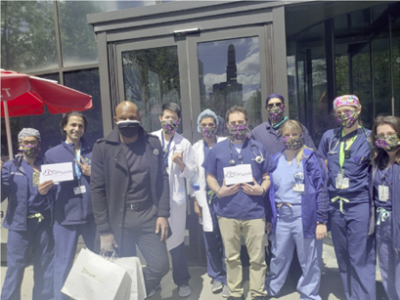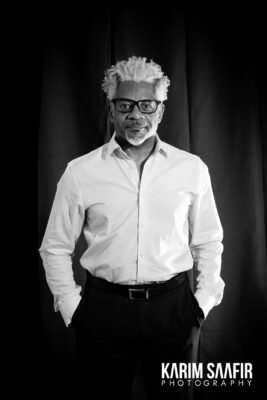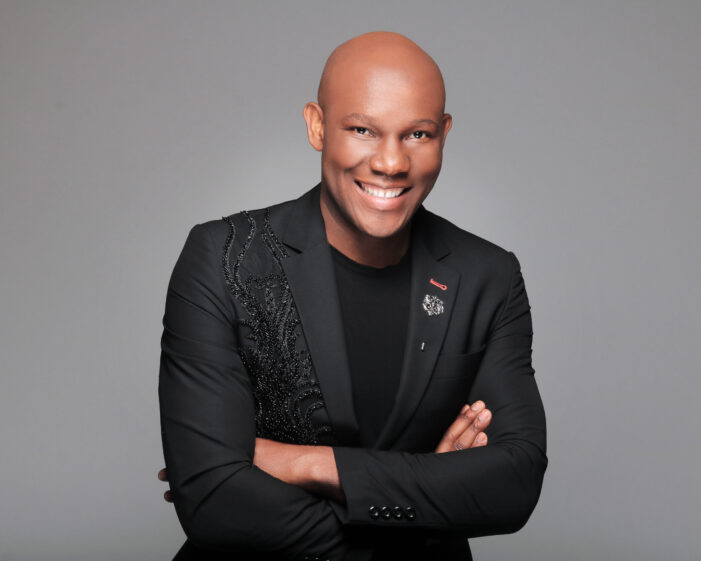Fashion leader TJ Walker, one of the co-founders of the Black Design Collective, spoke on the
challenges of black designers in the aftermath of the pandemic. Jamaican designer Glenroy
March shared how he kept his brand alive by fleeing to Ghana.
By Pearl Phillip
At the start of the Covid pandemic, designer Glenroy March made the bold and risky decision to
leave New York, the fashion capital of the world, and head to Ghana, Africa. March is the creator
of House of D’Marsh (www.dmarshcouture.com), which features custom-made formal wear and
wedding gowns, DM by D’Marsh, a ready-to-wear clothing line; and lifestyle products such as
candles, body and bath, and cosmetics.
Listen to March’s interview with Business Matters Podcast here
The pandemic was described as a Black Swan for the fashion industry. Black Swan events are
characterized by their extreme rarity, their severe impact, and the widespread insistence they
were apparent in retrospect. New York was not spared as one of the world’s fashion capitals.
Many companies faced bankruptcy. The impact on black designers was severe.
“Everyone thought I was crazy,” March said, “I will never forget on March 14, 2020, when
Covid hit, the first thing that came to my mind was, how am I going to keep the brand alive? And I said, what other talent do I have? I could teach fashion. The fashion masterclass in Ghana was
created through Covid. I teach all the tricks, the trades. I decided to go where the restrictions
were slightly lighter and chose Ghana.
I had one friend there, and I stayed in my apartment and built out the masterclass. I found a way
to survive. I was booming. I went to Ghana and taught a masterclass in fashion for three years.
That kept D’Marsh alive.”
He added, “I’m very grounded. Like, this is the D’Marsh brand. This is the path for the brand, and
I’m not going to detour over Covid or anything.”
A Dollar and a Dream
March started his dream of being a fashion designer twenty years ago. “I was 13 years old, and it
was Career Day. And the teacher asks me, what do you want to become? And I said I want to
make people beautiful. And he said, in clothes or makeup? I said clothes.”
March said on his journey, “It was a dream on a dollar. So, I want to really let people know that I
did not have what we call in Jamaica, a gold spoon in my mouth or what we say in America. I’m
from a middle-class family, so I did not have the money or the income to go ahead and do what I
did. So I keep dreaming and figuring it out. As I told someone just a while ago, hey, in Jamaica,
you have to make things work.” And work it did.
This year, March is celebrating his 20th year in the fashion industry. He has published a coffee
table book to commemorate his 20th Anniversary. House of D’Marsh had its genesis in the
Spring of 2003 when March launched his Spring collection during Caribbean Fashion Week in
Jamaica’s capital city, Kingston. This start gave rise to the pursuit of a passion by the talented
Jamaican who would later stun audiences locally and internationally.
Entrepreneurship comes with risks and rewards. March felt that doing something was better than
nothing. “As an entrepreneur, you have to take risks. You have to be bold and know what’s
important to you so you can work around that. So, as you notice, I don’t dwell on the negative or
the obstacles. I don’t worry about what people have to say. Staying in New York, I couldn’t do
anything; nothing was open. I decided to leave while I could. If you analyze too much, you will
never achieve anything. So, I want to get that clear. So, I was not focused on the negative or the
impossible. Of course, I did my homework.”
When Life Gives You Lemons, You Make Lemonade; When Covid-19 Happens, You Make Masks

Designer Glenroy March (in black) poses with the frontline workers at Brooklyn Hospital after making the donation. Photo courtesy of Glenroy March.
Before going to Ghana, Marsh produced masks. He shared how clients and friends bought masks
to support him. He presented healthcare workers at Brooklyn Hospital with a donation of masks
to thank them for their service. The staff expressed their gratitude to the Jamaican-born designer
adding that the fashionable masks would undoubtedly add color and brighten their day.
“Pivoting, I started producing masks,” he said.” And now it’s part of it. And you know what? The
online store works. People buy cosmetics, and bow ties, too, because people still have things at
home. When you have relationships with your clients, those relationships will ensure that you
stay alive. So, I had clients that would buy 20 masks and give them to their friends. But I know,
really, they’re just making sure that I stayed alive because nobody wants 20. So again, if you
build that relationship and stay grounded, no matter if another Covid comes or another thing, to
me, Covid was just another day in my world because you’re always going to face challenges.”
The Challenge for Designers of Color

Walker. Photo courtesy of TJ Walker
In March 2020, the coronavirus caused a full-scale lockdown in New York. Many industries
faced the brunt of Covid-19, the fashion industry among them. Many companies struggled during
the pandemic. Some collapsed.
“Covid-19 brought financial uncertainty and insecurity, and spending on fashion apparel quickly
decreased,” said Marian Zengel, assistant teaching professor and coordinator of Bowling Green
State University’s top-ranked apparel merchandising and product development program.
For many black fashion designers, the impact was severe.
“The impact on the industry … is very devastating,” said TJ Walker, co-founder of Crosscolours
and the Black Design Collective (www.Blackdesigncollective.com). The organization’s mission
is to help creatives of color navigate the fashion industry. Walker discussed the black fashion
industry and the challenges of moving forward.
Walker has over 30 years of experience in the fashion industry and has been an educator for over
20 years. His co-founders include Angela Dean, a designer for stars such as Patty Labelle, Kevin
Hall, design and creative director of Halston, and Ruth E. Carter, who made history in 2019 as
the first black woman to win an Oscar for costume design. She now has two Oscars, winning
another Academy award this year for her work on Black Panther: Wakanda Forever. Listen to
Walker’s interview with Business Matters Podcast here
According to a House Committee on Small Business report, the number of working Black
entrepreneurs declined 40 percent with the Covid-19 lockdown, a more considerable drop than
other ethnic groups.
One of the challenges for small businesses was applying for funding, an area the Black Design
Collective assisted with. “We created workshops to help them and guide them to those funding
streams (such as Small Business Administration grants) to guide them to potential funding for
their businesses and even the government subsidies and all the other things that were accessible.
We guided them through the application process and those kinds of things. We helped creatives
amass, to date, over $2 million in funding and grants because we didn’t have the funds within our
organization, but we can guide them to the funds, which we feel very good about,” Walker
explained.
Walker added, “If anyone’s in the fashion industry and the garment industry as well, or just the
economy in general right now, it’s really tough for retailers, and it’s really tough for those that are
trying to actually go into the fashion industry and do business as well. But we want to see how
we can help sustain and help those willing to go through it. And we’re doing that quite well by
introducing our education and training or classes that we’re launching this summer at our
Creative Center in downtown Los Angeles. The classes are available online as well.”
Moving Forward
In the aftermath of the pandemic, what’s next for the fashion industry and black designers in
particular?
Walker explained the direction he would like fashion designers to take is based on financial
literacy and business strategy. “Business structure and business development as well,” Walker
explained. “And then also international business and how to be self-sustained by setting up your
own business. And I mean your own business in terms of sales, which means that your website
or other web sales are the things you navigate to with your business, with the business in general.
Even for designers of color, I think it’s very important for you to look at the actual groundwork
and the actual playing field.”
Before the pandemic, many designers grappled with their online presence. The pandemic proved
to be a double-edged sword for some because they were forced to update their digital footprint.
“You need to get up on your technology and ensure your website is very accessible,” Walker
said.
“The retail spaces are closing; they’re shrinking because many are closing some of their
locations. And so that means that as a designer, you need to look at yourself as being that source
where people can come and purchase those goods.
“Mobile devices are something that really (are) important to your survival as well because most
people have a phone. So, you must ensure your product can be accessed from a mobile device.
And it’s seamless, too, as well. And the experience needs to be nice and seamless for anyone
wanting to participate and be a part of what you’re doing.”
Walker also talked about the need for fashion designers, especially black fashion designers, to
address social justice, climate change, and sustainable fashion in their work. “You need to be
more than just someone trying to sell clothes too. It needs to be something that is a give-back or
something where you’re addressing things like the nature of the environment or being
sustainable. These kinds of things, too, attract consumers in terms of different niches and could
make you have a larger stake in trying to get people to navigate to your brand.”
Words of Wisdom
Walker described his vision for people of color in the fashion industry. “I really want us to think
globally as a culture and as a people because we’re all over the world. And we must address the
fact that we’re all over the world. We’re all colors, and we also have different colors to contribute
to the fashion world, the fabrics of the fashion world, the textures, and all those different things.
And look at that and see how we can market amongst ourselves in terms of creating wealth that
serves to create a legacy in the industry for us. And those are the things, and I want us to get on
the ground level of the industry where we’re the ones growing the raw materials, whether it’s
hemp or in manufacturing those things, too,” he said.
This story was produced as part of the Small Business Reporting Fellowship, organized bythe Center for Community Media and funded by the NYC Mayor’s Office of Media and
Entertainment.
Additional info:
The Big Apple and the Fashion Industry
According to nyc.gov, New York City is the center of fashion. It offers world-class creative
talent, retail space in highly-populated locations, best-in-class production companies, and fashion
and design schools.
· NYC is also home to more headquarters of fashion designers and retailers than any other city in
the United States.
· New York City’s fashion industry employs 180,000 people, accounting for 6% of the city’s
workforce and generating $10.9 billion in total wages.
· An estimated 900 fashion companies are headquartered in New York City and are home to over
75 major fashion trade shows and thousands of showrooms.
New York City offers several initiatives to support businesses in the Fashion industry



